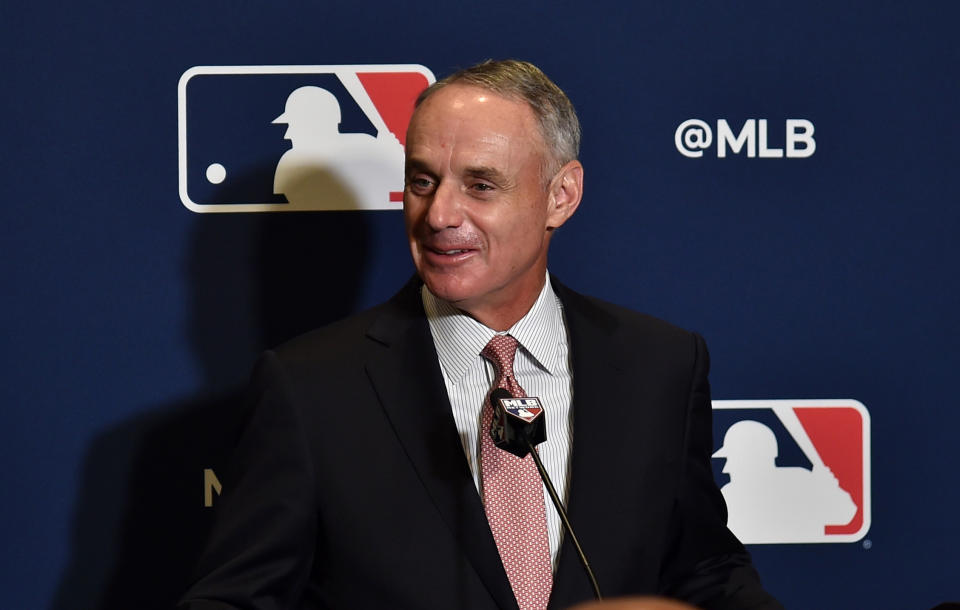Will brazen cheapness finally turn the public against MLB team owners?
Befitting Rob Manfred’s reputation as a shrewd labor negotiator, Major League Baseball devised a new strategy this week to defeat the players association in the entrenched economic fight that has stalled plans to schedule a coronavirus-shortened 2020 season. But it requires articulating the owners’ self-defeating obsession with the bottom line so plainly that perhaps it will finally cost them some ground in the battle over public perception.
On Wednesday, the league rejected the union’s 114-game plan and made it clear that rather than respond with a counterproposal, it will begin pursuing plans to unilaterally impose a season as short as 50 games. (While reportedly still preferring to negotiate, by which they mean the players are welcome to negotiate against themselves.)
The MLBPA believes the issue of player pay was settled in a March 26 agreement between the two sides that stipulated prorated salaries, and addressed a number of other issues that the sport faced in the immediate wake of suspending spring training and postponing the season. The league believes that language in that agreement around “economic feasibility” of restarting a season allows them to negotiate a further pay cut for the players now it’s become clear that games will be played without fans, at least at first. The union disagrees with that interpretation, as well as the league’s assertion that owners will lose money on every regular season game.
The past few weeks of negotiations have failed to bring the league and the union closer together. Without a hard deadline to force a reckoning, no amount of hand-wringing editorials lamenting a failure to find common ground — and how it could kill the sport’s national relevance entirely — has convinced either side to propose anything that the other might actually accept.

The next Collective Bargaining Agreement looms just beyond the 2021 season. With labor tensions running high and hot the past few years, both the union and the league have prioritized demonstrating their intractable strength while espousing outrage.
This is particularly frustrating while the rest of the sports landscape begins to stir after months of stasis. But it’s disingenuous to compare baseball’s economic quagmire to, for example, the relative ease with which the NBA seems prepared to resume its season. By all accounts, MLB’s players and owners are in agreement about a universal DH and an expanded postseason, and are close to an agreement on the critical health and safety protocols. If only that was all it took to get an opening day on the calendar.
The NBA, which already played the vast majority of its games, is not requiring its players to take a massive pay cut (relative to their usual annual salaries — there was a complicated series of withholdings and repayment plans worked out for the remaining games) as a prerequisite for playing again. Money is always the sticking point in labor talks.
If baseball fails to return this season, both sides should be ashamed of how they’ve squandered an opportunity. The extended, hostile negotiations have likely sacrificed their future earning potential and the economic vitality of an industry that employs people who are neither millionaires nor billionaires. But baseball is not a civil service and labor disputes are not obligated to be polite. We should, however, pay attention to what they reveal.
The league has now indicated that it is prepared to impose — or at least threaten to impose — a drastically shortened season for the sake of slashing player salaries to desired levels while still technically honoring the prorated payment terms of the March agreement. In doing so, Manfred and the owners would declare the negotiations a failure and effectively cut the hours of their employees who refused to agree to lower wages. All of which they seemingly can do, and it would be a success.
Assuming that is, that the goal is to optimize money and not baseball.
That is an almost embarrassingly trite and self-evident thing to say based on the behavior of Major League Baseball owners over the past few years. Of course they’re more concerned with minimizing costs than retaining top talent or paying minor league players a living wage. But it’s worth emphasizing that they just announced they’re also more concerned with savings than even hosting baseball games. They’re betraying more than the spirit of competitive balance with their cheapness now, they’re also depriving fans of the very product they’re trying to sell.
[Is baseball coming back? Follow the latest updates here.]
The league’s initial proposal was for 82 games. That’s the number they deemed reasonable several weeks ago. Now they’re saying if the players don’t give owners a deal on their services during a uniquely unsafe season, they’ll rescind up to 32 games — cutting off their own nose and throwing it in the face of all their fans just to spite the players and avoid having to meaningfully open up the books.
There’s been a lot of talk about how bad these negotiations look for both sides, about the fans they stand to lose. And the union’s leaders are certainly guilty of digging their heels in even when it no longer serves them to do so. But this would be the unilateral decision of just one side — the owners as represented by Manfred and the league office. If baseball’s return is so important for the psyche of the country, why are its gatekeepers arguing for less of it?
The owners are prepared to play their trump card, and it just might work to keep the player salary costs at roughly 31 percent of what they would be in a regular season, but in doing so they tipped their hand and showed the world their priorities. And baseball games — literally, games of baseball that they have the power to create and vanish — are explicitly not it.
More from Yahoo Sports:

